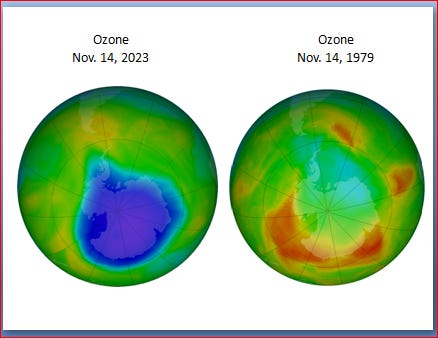Environmental Impacts of Satellites: Sign the Public Interest Research Group Letter to the FCC, and More
Dear FCC Space Bureau Chief Julie Kearney, 'The new space race doesn’t need to create massive space waste.'
Image by WikiImages from Pixabay Compiled with Kate Kheel of Safe Tech International.
The number of satellites in orbit is skyrocketing, and the environmental risks may be massive.
Public Interest Research Group Letter to the FCC
PIRG is a federation of independent, state-based, citizen-funded Public Interest Research Groups, and is part of The Public Interest Network, which operates and supports organizations committed to a shared vision of a better world and a strategic approach to social change.
On October 24, 2024, the Public Interest Network submitted a Letter to the FCC signed by 120 astronomy, astrophysics and space experts from top universities about the Commission's lack of environmental review for satellites.
"The number of large satellites in low Earth orbit has increased 12 times in five years, in large part because of SpaceX. The new space race is ramping up quickly: Some experts estimate an additional 58,000 satellites will be launched by 2030. In response, 120 astronomy, astrophysics and space experts from top universities sent a letter Thursday to the Federal Communications Commission asking the agency to study the effects of satellite mega-constellations on space, the atmosphere and environment." (Read more HERE)
The letter generated some good media coverage (relatively speaking given the times):
The Register, Gizmodo, LA Times, Space.com, and more.
Direct Action to Take in Support of the PIRG Letter to the FCC- Sign on
Scientists, space experts, and environmentalists please sign the Expert’s Letter
Members of the public can sign on to Tell the FCC: Satellite mega-constellations need environmental review. (NB, it's possible only US residents can sign.)
"That launching 30,000 to 500,000 satellites into low earth orbit doesn’t even warrant an environmental review offends common sense." - The Public Interest Network
GAO Government Accountability Office
In November 2022, the US Government Accountability Office (GAO) released a report, “Satellite Licensing: FCC Should Reexamine Its Environmental Review Process for Large Constellations of Satellites.”
In April 2023, the FCC launched Space Bureau and Office of International Affairs. However, according to PIRG, "the agency’s avoidance of responsibilities under the National Environmental Policy Act means it might not have the capacity or expertise to oversee the new space race."
Additional Prior Expert Submissions to the FCC
The Balance Group: Filings to the FCC opposing SpaceX's next generation (Gen2) satellite network launch and operating authority request
Broadband International Legal Action Network (BBILAN) re: Satellites https://www.bbilan.org/hhtisatellites
2024 Politics and the Urgent Need for Action to Safeguard the Skies
Regulatory agencies in the US which are already in bed with the industries they regulate, will likely see a further decrease in regulatory oversight during the next four years given Elon Musk's close ties with President Elect Trump. With rising geopolitical tensions, and the United States' mission to dominate and control space at all costs, and "deny others the use of space if required" (See Space Command Vision for 2020) we have our work cut out for us.
Satellite Phones and Disaster Capitalism?
Recent flooding in Asheville, North Carolina has intensified discussion about satellite cellphone infrastructure. See GUARDS' objections and comments for satellite launches submitted to the FCC, and a one-page summary about rocket soot exahust and black carbon from launches HERE
Astronomers' Appeal
Astronomer and technologist Stefano Gallozzi was the organizer and promoter of the Appeal by Astronomers Safeguarding the Astronomical Sky which has been signed by about 2100 astronomers. (See also, Fondazione SAS: Safeguarding the Astronomical Sky, and the list of signatories to the Appeal)
Stay Informed, Join Engaged Action Groups
Professional astronomers, technologists, engineers, PhD students, collaborators and, or associates at international scientific institutes, please sign the Astronomical Appeal
Join Safeguarding the Astronomical Skies HERE.
Become more informed – Check out Microwaving Our Planet and Tech and the Military
Share this online resource – Technology, Artificial Intelligence, the Military and War.
Become a member of the Global Network Against Weapons and Nuclear Power in Space.
Subscribe to Arthur Firstenberg's newsletters for a wealth of information about all things EMF, satellites, and mountains of love pouring out from his urgent cries in defense of Earth.
Add your voice to the Facebook group and actions, Global 5G Protest for Freedom.
Learn More: Free The Sky
In 2021, Free The Sky and Safe Tech International, along with other organizations, sent a letter of concern to SpaceX regarding pollution. Free the Sky explains,
Industry and government have done little research and claim the “big sky” can absorb any problems. And there’s virtually no federal oversight — the FCC exempts them from environmental review.
But, major problems exist —
ozone destruction
pollution: rocket exhaust gases, black carbon, alumina, other toxic chemicals
fossil fuel use and climate impacts
debris and satellite accumulation, risking collisions
de-orbiting crashes, pollution, casualties and fires
RF-EMF impacts to humans, wildlife, plants, and trees
loss of night sky
interference with astronomy
RF interference with GPS, airplanes, weather satellites
global electrical circuit interference
solar flare disruption to satellites and connected IoT network societies
energy usage
Despite these grave hazards and ignoring experts’ warnings, companies and governments are moving ahead with this worldwide experiment. Their actions risk turning Earth into Mars. The costs will fall on the public.
Satellite “Disposal”
Myth: Old satellites and rockets burn up on re-entry and vaporize — ie. vanish.
Fact: Re-entry causes satellites and rockets to burn, explode, and fall apart into large and small chunks, down to tiny particles, of debris. Vaporization creates toxic gases and dust.
You might think of this as the U.S. Environmental Protection Agency’s largest Superfund cleanup. — Marshall Kaplan, Applied Physics Laboratory, 2009
Many rocket stages, engines, and tests are dumped into the ocean, and the space industry “disposes” of spent satellites by either maneuvering them into long-lasting “graveyard” orbits or “de-orbiting” them so that they “burn up”. Some orbits are so congested with junk now as to be “unuseable”. Many of these satellites will be in Low Earth Orbit (LEO) with only 5-7 year lifespans. De-orbiting satellites causes high levels of pollution, debris, and dust in the atmosphere which falls out on the Earth. Alumina is highly flammable. Last year flaming debris caused fires in Chile, and a still operating Samsung satellite crashed into a horse farm in Michigan, its balloon falling onto powerlines. These satellite mega-constellations increase the problems to lives and property exponentially.
Learn More: The Global Network: Advocating For Space and Peace Since 1992, Still Going Strong
The Global Network Against Weapons and Nuclear Power in Space has been actively seeking peace in space and working on other space issues as well since 1992, with 157 affiliate groups worldwide. They offer webinars, blogs, informative videos to share, and a Keep Space for Peace Week yearly in October where people are invited to organize local awareness-raising events.
Thank God men cannot fly, and lay waste the sky as well as the earth. — Henry David Thoreau
For a fascinating history of the early years of the space race and activism, listen to this recording by Bruce Gagnon. The only significant changes since then are the speed and lethality of warfare "thanks to" to innovations in technology and AI. (40 minutes)
Water? Debris? Boca Raton Shoreline: “‘Elon Always Said This was the Place to Launch Rockets Because There’s Nothing Here, That it’s Just a Big Wasteland’“
Safe Tech International: SpaceX & Mars & Explosions & Injuries: It’s Not Just Where We’re Going, It’s How We Get There and Who Pays the Price
In 2021, Paris Marx of Tech Won’t Save Us interviewed Eric Roesch on SpaceX’s Regulatory Evasion Has Consequences. “Eric Roesch is an expert in environmental compliance and risk assessment who writes about intersection of capitalism, markets and greenwashing. Eric wrote about the damage the Starship launch was going to have, SpaceX’s violation of the Clean Water Act, and Elon Musk’s general regulatory evasion. He also shared [] photos of the aftermath of the Starship launch.” – Source
Recent Satellite Pollution News
'There is now a Starlink reentry almost every day.'
How much do SpaceX's reentering Starlink satellites pollute Earth's atmosphere? Tereza Pultarova | October 17, 2024
Radio Frequency Transmissions?
"On Earth, laws regulate how much a device’s radiation can interfere with one nearby. But for satellites, this kind of radiation isn’t subject to any international laws." - Cees Bassa
SpaceX satellites leaking radio waves. Astronomers worried Kelly Kizer Whitt| July 12, 2023
In Case You Missed It: The California Coastal Commission Takes a Stand for Earth and Against Increasing Launches
Nina Beety reported, “Thursday, October 17, the California Coastal Commission “objected to” SpaceX's launch expansion to 50 launches per year at Vandenberg Air/Space Force Base north of Santa Barbara by a 6-4 vote. It is uncertain whether this objection will actually stop increased launches. SpaceX is nearing or already at its 36-launch limit, the Space Force said.
The US Space Force was the applicant for the SpaceX launch increase. Commissioners said this was inappropriate and that SpaceX should apply for a permit on its own. SpaceX is a private company, and the bulk of its launches are private, not for the federal government. However, they felt pressure to act and put something in the record, while working to compel SpaceX to apply on its own. The Commission has limited authority over a federal agency but much more jurisdiction over a private company.
There were some objections by commissioners over SpaceX practices, labor abuses, Elon Musk public statements and actions, and on some environmental problems like sonic booms. Public comments were from the Sierra Club California, Surfrider Foundation, other local non-profits, and individuals on effects including sonic booms and disruption to wildlife including endangered species, ozone loss, climate change, marine debris, and other environmental impacts, opposing global Wi-Fi and 5G, or militarization of space.
Elon Musk is suing the Coastal Commission for including his “free speech” comments as a reason for denial.
In August the Space Force refused to answer any questions, but this month, both Assistant Secretary of the Air Force Ravi Chaudary and Col, Mark Schumacher of the Space Force spoke and answered questions. Commissioners lavished praise on the Space Force for finally working
with Commission staff in the last few weeks and agreeing to the environmental monitoring program, but reiterated that SpaceX should be the applicant, not the Space Force. A SpaceX rep briefly spoke during public comments by zoom, but didn't attend the hearing in person or
speak as the applicant.
Space Force planned to return to the Commission early next year to ask to increase launches to 100 per year.”
Staff report and public correspondence is linked in agenda item 9a under Thursday. https://www.coastal.ca.gov/meetings/agenda/#/2024/10 Video of the 10-10-24 hearing: https://cal-span.org/meeting/ccc_20241010/ 2:54:47 – The staff powerpoint is in the dropdown menu for presentations “staff-th9a-deppe-pptx”
Food For Thought
Source: Global Network
Satellites weave together digitalization and data streams from all domains: earth, ocean, sky, space, cyber space, bodies, and minds.
It's time we humans weave together hearts and minds through cooperation, moderation, and contentment with "just enough".
“The race is over, time to go Home.” - Kate














Signed and shared.